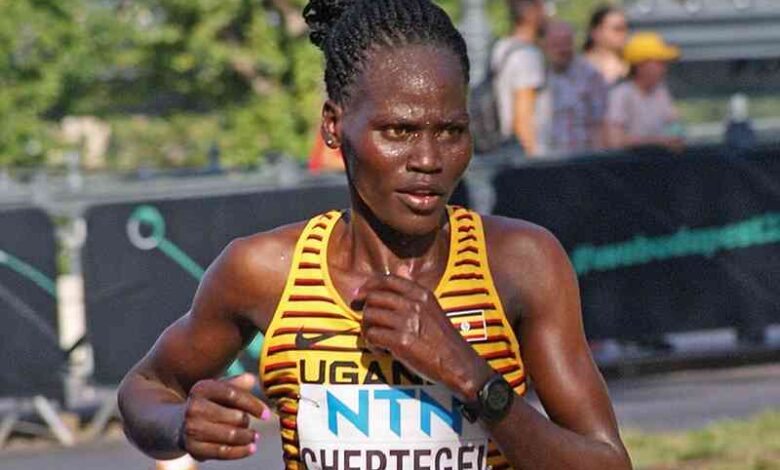The tragic death of Cheptegei and the growing threat to female athletes
The attack, which left her with burns covering over 80% of her body, sent shockwaves through the global athletics community.

In a quiet corner of Bukwo, eastern Uganda, thousands gathered to mourn the loss of a national hero. Olympic marathon runner Rebecca Cheptegei, once celebrated for her endurance and grace on the track, was laid to rest—not as a champion, but as the latest victim in a disturbing wave of violence against women.
The 33-year-old mother of two, known for her resilience in races and a heart of gold off the track, was brutally set ablaze by her former boyfriend, Dickson Ndiema, just two weeks ago in Kenya.
The attack, which left her with burns covering over 80% of her body, sent shockwaves through the global athletics community.
But beyond the horror of the crime itself, Cheptegei’s death has cast a harsh spotlight on a terrifying pattern—female athletes are increasingly becoming targets of violence from those closest to them.
From Athlete to Advocate: A Dream Cut Short
Cheptegei’s journey from a small village to international tracks was nothing short of inspirational. Born in the remote hills of Bukwo, she found solace in running, a sport that would later take her to the Paris Olympics, where she finished 44th in the marathon.
Despite this ranking, she was hailed as a champion by her community—a beacon of hope for young athletes, especially girls who dream of breaking the chains of poverty and gender inequality through sports.
“She lived a simple and focused life,” one local leader recalled at the memorial. “Her determination inspired many children in the area to join athletics.” Cheptegei wasn’t just a runner—she was a mentor, a motivator, and a fighter for the dreams of others.
But her life was not without its battles. Behind the bright smiles and victories, Cheptegei, like many female athletes, faced the shadows of domestic abuse—a darkness that ultimately consumed her.
The Growing Danger for Female Athletes
The brutal killing of Cheptegei is not an isolated incident. It follows a chilling trend of violence against female athletes in East Africa, where romantic partners have turned from supporters to killers.
In 2021, world record holder Agnes Tirop was stabbed to death by her boyfriend. Just months later, fellow runner Damaris Mutua was strangled. Both cases mirrored Cheptegei’s tragic fate, raising questions about the safety and security of women, especially those in the limelight.
Experts point to a disturbing rise in violence against women in Kenya, where 34% of women reported experiencing physical violence in 2022. But for female athletes, the dangers seem even more pronounced.
“Women who achieve success often face resentment from their partners, particularly in societies where traditional gender roles are deeply entrenched,” said Dr. Esther Namara, a gender expert from Kampala.
“When these women surpass their partners in terms of fame or finances, the dynamic shifts, and unfortunately, that shift can turn violent.”
A Call to End Gender-Based Violence
At Cheptegei’s funeral, fellow athletes donned black T-shirts emblazoned with the words “Say No to Gender-Based Violence,” standing in silent protest against a scourge that has stolen too many bright futures.
In a heartbreaking moment, her mother, Agnes Cheptegei, dressed in a T-shirt with the slogan “Being a woman should not be a death sentence,” clutched a souvenir bag from the Paris Olympics—a painful reminder of her daughter’s last race and the promise that was extinguished far too soon.
The community is now calling for Cheptegei’s name to live on, not just in memory but through action.
Proposals to name a road and a local sports venue in her honor are in motion, ensuring that future generations will remember the woman who inspired many. But for activists, these gestures are not enough.
“We need systemic change,” urged Dr. Namara. “Until we address the root causes of gender-based violence and ensure legal protections for women, we will continue to lose women like Rebecca.”
Cheptegei’s story highlights the unique pressures faced by female athletes, many of whom struggle to balance their success with societal expectations.
Despite joining the Uganda People’s Defence Forces in 2008 to help fund her athletic career, Cheptegei’s rise to fame also marked the beginning of her personal struggles. Ndiema, the man she had once loved and supported, turned from partner to predator.
In her final days, as she lay in a hospital bed, Cheptegei reportedly questioned why Ndiema would commit such an unthinkable act.
“You mean Dickson is not able to see all I have done for him?” she asked a friend in disbelief. It was a haunting reflection on the sacrifices many women make in relationships, often at the cost of their own well-being.
Honoring a Fallen Champion
Rebecca Cheptegei was more than just an Olympic runner. She was a mother, a mentor, and a symbol of hope for women in sports. Her death is a sobering reminder of the urgent need to protect women from the violence that continues to claim their lives.
As Uganda mourns the loss of one of its brightest stars, the world must confront the painful truth: being a successful woman, even in the highest echelons of sport, does not make one immune to the dangers of gender-based violence.
As the community in Bukwo buries its champion, the message is clear—this cannot be the fate of future generations. In Rebecca Cheptegei’s honor, we must strive for a world where women can live, love, and succeed without fear.







